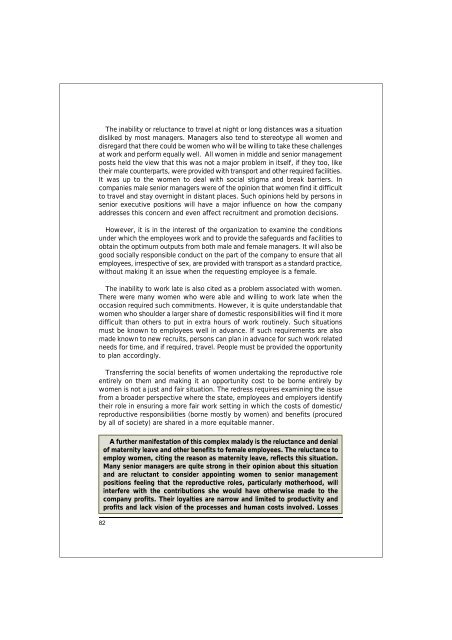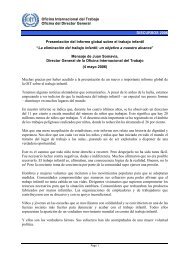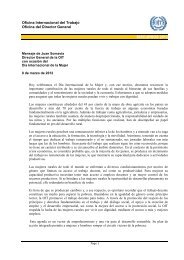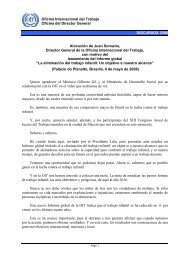Beyond Glass Ceilings and Brick Walls - International Labour ...
Beyond Glass Ceilings and Brick Walls - International Labour ...
Beyond Glass Ceilings and Brick Walls - International Labour ...
You also want an ePaper? Increase the reach of your titles
YUMPU automatically turns print PDFs into web optimized ePapers that Google loves.
The inability or reluctance to travel at night or long distances was a situation<br />
disliked by most managers. Managers also tend to stereotype all women <strong>and</strong><br />
disregard that there could be women who will be willing to take these challenges<br />
at work <strong>and</strong> perform equally well. All women in middle <strong>and</strong> senior management<br />
posts held the view that this was not a major problem in itself, if they too, like<br />
their male counterparts, were provided with transport <strong>and</strong> other required facilities.<br />
It was up to the women to deal with social stigma <strong>and</strong> break barriers. In<br />
companies male senior managers were of the opinion that women find it difficult<br />
to travel <strong>and</strong> stay overnight in distant places. Such opinions held by persons in<br />
senior executive positions will have a major influence on how the company<br />
addresses this concern <strong>and</strong> even affect recruitment <strong>and</strong> promotion decisions.<br />
However, it is in the interest of the organization to examine the conditions<br />
under which the employees work <strong>and</strong> to provide the safeguards <strong>and</strong> facilities to<br />
obtain the optimum outputs from both male <strong>and</strong> female managers. It will also be<br />
good socially responsible conduct on the part of the company to ensure that all<br />
employees, irrespective of sex, are provided with transport as a st<strong>and</strong>ard practice,<br />
without making it an issue when the requesting employee is a female.<br />
The inability to work late is also cited as a problem associated with women.<br />
There were many women who were able <strong>and</strong> willing to work late when the<br />
occasion required such commitments. However, it is quite underst<strong>and</strong>able that<br />
women who shoulder a larger share of domestic responsibilities will find it more<br />
difficult than others to put in extra hours of work routinely. Such situations<br />
must be known to employees well in advance. If such requirements are also<br />
made known to new recruits, persons can plan in advance for such work related<br />
needs for time, <strong>and</strong> if required, travel. People must be provided the opportunity<br />
to plan accordingly.<br />
Transferring the social benefits of women undertaking the reproductive role<br />
entirely on them <strong>and</strong> making it an opportunity cost to be borne entirely by<br />
women is not a just <strong>and</strong> fair situation. The redress requires examining the issue<br />
from a broader perspective where the state, employees <strong>and</strong> employers identify<br />
their role in ensuring a more fair work setting in which the costs of domestic/<br />
reproductive responsibilities (borne mostly by women) <strong>and</strong> benefits (procured<br />
by all of society) are shared in a more equitable manner.<br />
A further manifestation of this complex malady is the reluctance <strong>and</strong> denial<br />
of maternity leave <strong>and</strong> other benefits to female employees. The reluctance to<br />
employ women, citing the reason as maternity leave, reflects this situation.<br />
Many senior managers are quite strong in their opinion about this situation<br />
<strong>and</strong> are reluctant to consider appointing women to senior management<br />
positions feeling that the reproductive roles, particularly motherhood, will<br />
interfere with the contributions she would have otherwise made to the<br />
company profits. Their loyalties are narrow <strong>and</strong> limited to productivity <strong>and</strong><br />
profits <strong>and</strong> lack vision of the processes <strong>and</strong> human costs involved. Losses<br />
82
















